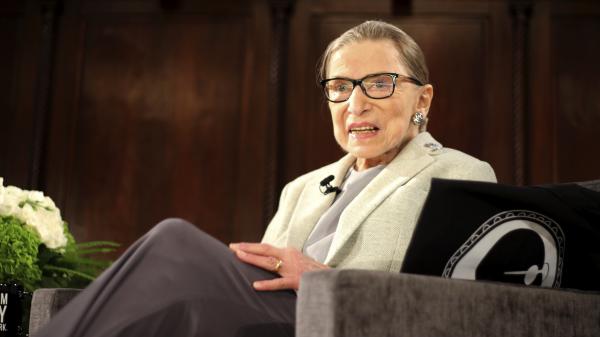Disclosures Recall the Full Lives the Justices Lead When There's No Pandemic
Reports show Ginsburg and Sotomayor took lots of trips in 2019; disclosures from Alito, Gorsuch and 1,200 other federal judges are missing
 Ruth Bader Ginsburg and Sonia Sotomayor each took a dozen or more free trips last year, and Clarence Thomas nearly maxed out his teaching compensation while his wife’s consultancy may have skyrocketed in value, according to the 2019 financial disclosure reports of Supreme Court justices, seven of which were released today.
Ruth Bader Ginsburg and Sonia Sotomayor each took a dozen or more free trips last year, and Clarence Thomas nearly maxed out his teaching compensation while his wife’s consultancy may have skyrocketed in value, according to the 2019 financial disclosure reports of Supreme Court justices, seven of which were released today.
The reports of Justices Samuel Alito and Neil Gorsuch were not included on the disclosures thumb drive FTC received in the mail today. By law, the two are permitted to request up to a 90-day extension, and no reason for the delay was given.
“Transparency in the judiciary is always one step forward, one step backward. Receiving digital copies of most of the justices’ disclosures amid a pandemic is commendable, but since we have no idea when Alito’s or Gorsuch’s reports will arrive, why they’re late or how the 1,200 remaining Article III disclosures will be made public, the courts still have have a long way to go on openness,” FTC executive director Gabe Roth said.
Four of Ginsburg’s 12 reimbursed or paid-for trips in 2019 were to New York – at the last of which, on Dec. 16, she accepted the $1,000,000 Berggruen Prize that, according to the disclosure, she donated “to various charitable organizations.” Of Sotomayor’s 16 trips, 10 were paid for completely or in part by Penguin Random House, her book publisher, and she reported $21,533.64 in royalties last year for “Turning Pages,” the young readers’ version of her autobiography.
Those two were the only justices to include awards or gifts: Ginsburg’s Berggruen Prize and Gilel Storch Award ($27,000 from a Swedish foundation, also donated) and three honoraria to Sotomayor of $13,000, $2,000 and $2,000, all of which she says she donated. According to the 1989 Ethics Reform Act, $2,000 is the cap on an honorarium that a government official may accept for the purpose of immediately donating it. Though the Supreme Court is not included in the law, Chief Justice William Rehnquist wrote in 1991 that the justices would follow its strictures. Via open records requests, FTC has found that justices do receive ample gifts (p. 11) when they make public speeches, but they often fall below the $390 reporting threshold.
Active federal judges and justices may earn up to 15 percent of Level II of the Executive Schedule, $192,600 in 2019, or $28,890, in addition to their salaries, which is just $450 more than what Justice Clarence Thomas earned last year ($28,440) for teaching at the law schools of George Mason (Scalia), Creighton and GW.
Additionally, Justice Elena Kagan earned $17,500 for teaching at Harvard Law, and Justice Brett Kavanaugh earned $12,500.04 for teaching a Scalia Law class in England; both occurred during the summer. Harvard Law will be all digital through the end of the year, and many of Scalia Law’s summer programs have been canceled.
Thomas listed the value of his wife’s consultancy, Liberty Consulting, as between $100,001 and $250,000 in 2019, while last year it was only valued at between $15,001 and $50,000. No reason was given for the increase, though her influence with the Trump administration is well documented.
Unlike in years past, Chief Justice John Roberts (five companies) and Justice Stephen Breyer (eight) did not sell any of their individual stocks in 2019, though since FTC started tracking their securities, they have significantly dropped in number, with Roberts going from 13 in 2014 to five in 2018 and Breyer going from 17 in 2014 to eight in 2018. (See the justices’ stocks here.)
They and Alito are the only justices who own individual stocks, with the rest of the justices investing solely in instruments like bonds, retirement accounts, index funds or mutual funds that are unlikely to force recusals. Of the shares in 27 companies Alito held at the end of last year, FTC is confident he still owns Becton Dickinson, ConocoPhillips, Phillips 66 and United Technologies stock and has sold his Oracle shares, based on recusals noted in 2019 orders lists. The other 22 remain a mystery.
Neither the conservative Federalist Society nor the liberal American Constitution Society is mentioned in any of the disclosures.
Also not mentioned today were updates to two justices’ disclosures based on information FTC uncovered this spring. Back in March, we found via open records requests to public universities that Sotomayor’s lodging and transportation costs were covered by the University of Rhode Island when she traveled to the state May 20-22, 2016, to speak at commencement. That trip was omitted from Section IV of her 2016 disclosure report.
We also noticed that Thomas included the income he made teaching at the University of Kansas School of Law and the University of Georgia School of Law in his 2018 disclosure yet failed to mention in Section IV if either paid for his food, travel and lodging during his visits.
On March 23, Supreme Court PIO Kathy Arberg said the justices would at some point amend their earlier reports to fix those errors.